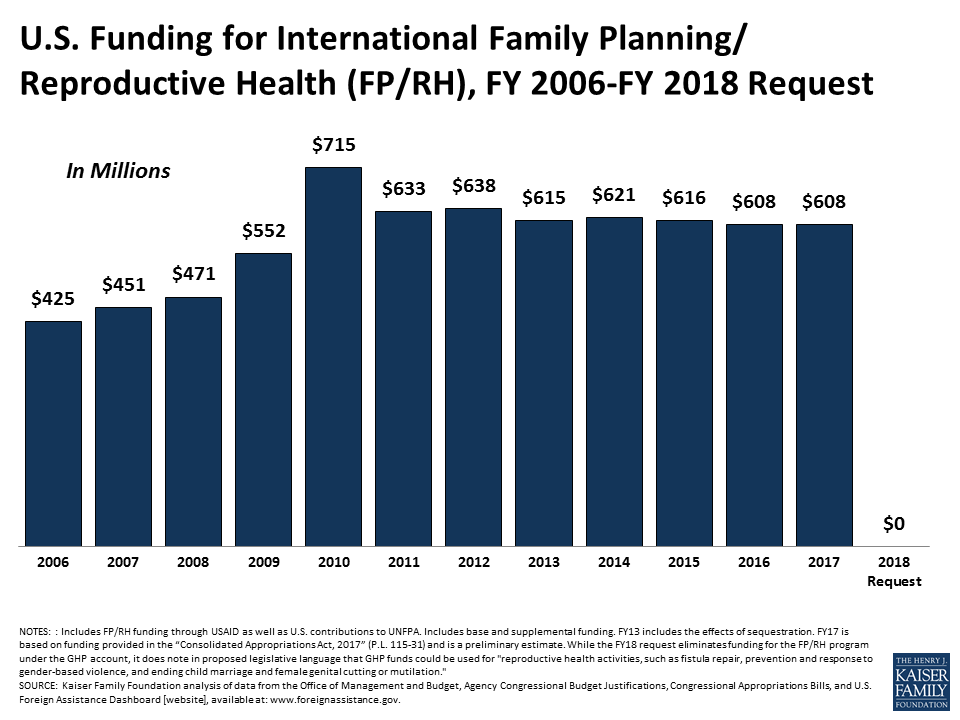During his June 2015 candidacy announcement speech, then-candidate Donald Trump declared that the US must “stop sending foreign aid to countries that hate us” and instead “use that money to rebuild our tunnels, roads, bridges and schools.” Since being elected, his positions on US global health assistance have consistently aligned with his 2015 pledge, posing an increasing threat to the future of health in developing countries.
The “global gag rule”
Trump’s first blow to the global health agenda came just days after his inauguration in January 2017, with his reinstatement of the Mexico City Policy or, as it is referred to by activists, the “global gag rule.” The policy dictates that non-governmental organisations (NGOs) that promote or facilitate abortion as a means of family planning are blocked from receiving federal funding from the US government. Beyond simply reinstating the rule, Trump in fact expanded the policy to encompass all NGOs that receive US funding, rather than strictly family planning organisations as the policy had previously included.

In a letter to US Secretary of State Rex W. Tillerson in October 2017, Human Rights Watch outlined their concerns over the potentially devastating consequences of the policy for the work of NGOs in Kenya and Uganda. Following interviews with representatives of 45 groups across the two countries, they explain that the policy is likely to lead to increased levels of unsafe abortion and associated maternal deaths. This is fundamentally because the policy prohibits information sharing: “any clinic, any hospital, any nutrition program that receives US foreign assistance dollars will now be required to certify that it doesn’t even give information about safe abortion or tell women where they can find out about abortion,” an Amnesty International spokeswoman explained.
Human Rights Watch highlight the most serious ramification of Trump’s expansion of the policy at the community level: NGOs must now “choose between funds for lifesaving antiretroviral therapy for their members or lifesaving reproductive health services.” Large organisations which facilitate abortion alongside a wider network of aims including HIV/AIDs reduction, for example, would see their funds cut for all projects. This means that the rule increases the potential not only for maternal-related deaths but also for a steep slowing of survival from diseases such as AIDs. The problem for NGOs is compounded by the fact that the US provides one-third of total global health aid: organisations have little way of closing the funding gap. Indeed, Bill Gates has made clear that organisations like his own are not prepared to plug such gaps: their spending of $3 billion a year on development assistance is around one-tenth of the total US foreign aid budget, standing at $143 billion.
Budget cut proposals
Trump’s second rejection of the pressing global health agenda arose with the 2018 United States Federal Budget proposal earlier this year. The budget outlines a staggering 24% cut in spending on foreign global health assistance compared to the last budget planned during the Obama administration. The funding typically facilitates research and development to combat deadly tropical diseases, as well as access to basic healthcare in poor countries. Significant funding is channelled into research on the “Big Three” neglected diseases of HIV/AIDs, malaria and tuberculosis. As the US provides such a significant proportion of aid for global health, a $2 billion cut would have devastating global consequences: not only does funding prevent death from disease, it also allows for political and economic stability, as a treated person can enter the workforce and have a productive impact on the economy. In fact, the Gates Foundation has highlighted in their Annual Letter that for every dollar spent on childhood immunisations, $44 is reaped in economic benefits later on. Thus, if the proposal to cut funding so drastically was passed, it would have tragic implications for the economic stability of many developing countries, especially in Africa.

Following Trump’s initial proposal to Congress, both the House of Representatives and the Senate rejected Trump’s plans to drastically cut global health funding, recognising the cruciality of maintaining lifelines for developing countries crippled by disease. Although the funding proposed by the House and Senate remains cut compared to that of the Obama administration, the reduction is significantly less than that proposed by the Trump administration: in their respective plans, the House provides 0.9% less funding than the level enacted in 2017, whilst the Senate provides just 0.2% less funding than in 2017.
However, although most of the aid has been protected for the time being, a cut is still a cut: the Trump administration has practically self-identified as a stumbling block to furthering the global health agenda. This harsh outlook on global health funding comes at a time when the US incentive to give aid should be at its highest in the wake of global health crises which affect US citizens as well as those in developing countries, such as the 2014 Ebola epidemic. Worryingly, there is a high risk that Trump’s administration will continue to chip away at Congress in future until they agree to significantly lower aid budgets.
Observing both Trump’s reinstatement of the Mexico City Policy and his proposal to drastically scale back the global health aid budget, it is clear that global health is not a priority for the President. Although this poses a serious risk for the future of funding, there is hope: following the reinstatement of the global gag rule, a conference in Brussels attracted countries including Belgium, Sweden and Finland to pledge millions to plug the gap opened by the policy. Moreover, comfort should be found in the fact that Trump’s 2018 health aid budget proposal, which activists have labelled ‘draconian’, has been rejected by Congress: Trump’s potential to devastate the global health mission is being quashed, for now.


